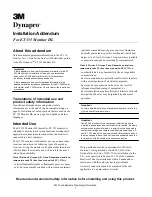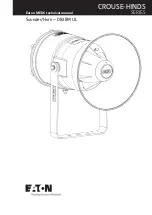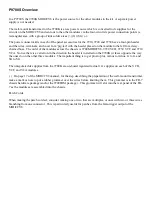
Page xxxii
IB131021EN
Effective Mar 2018
DO NOT WORK ON A BREAKER ELEMENT WITH
SPRINGS CHARGED OR CONTACTS CLOSED.
DO NOT DEFEAT ANY SAFETY INTERLOCKS.
DO NOT STAND LESS THAN ONE METER AWAY
FROM THE BREAKER ELEMENT WHEN TESTING
FOR VACUUM INTEGRITY.
FAILURE TO FOLLOW ANY OF THESE INSTRUCTIONS
MAY CAUSE DEATH, SERIOUS BODILY INJURY, OR
PROPERTY DAMAGE. SEE
SECTION 2 - SAFE
PRACTICES
FOR MORE INFORMATION.
6-2
FREQUENCY OF INSPECTION AND
MAINTENANCE
Periodic inspections and associated maintenance are
essential to the safe and reliable operation of VCP-WL
Vacuum Circuit Breaker Elements. The inspection
frequency and associated maintenance recommended are
intended to insure the best possible ongoing service. It is
imperative that an established schedule be followed. To
establish an exact schedule for a specific installation, use
the following guidelines:
Customers such as Utilities having extensive
1.
experience with Power Distribution components should
schedule their inspection and maintenance intervals
using well established best practices in their industry.
All other customers should use the following guidelines
2.
as good conservative practice:
In a clean, non-corrosive environment, inspect
a.
and maintain each circuit breaker element
every 5000 operations or 5 years, whichever
comes first.
For special conditions such as frequent circuit
b.
breaker element operation, contaminated
environments, and high temperature/humidity
conditions, the inspection frequency should be
a minimum of twice per year.
Fault interruptions have the greatest impact on contact
3.
erosion inside of the Vacuum Interrupters. Circuit
breakers that have been subjected to a full rated fault
interruptions should be immediately inspected and the
schedule for inspection and maintenance should be re-
evaluated based upon the inspection results.
Additionally, because of the variability of system fault
characteristics, if there are any customer uncertainties
in the records of the magnitude, duration, or other fault
details, increased inspection frequency should be
considered.
Follow the steps presented in Paragraph 6-3 entitled
4.
“Inspection and Maintenance Procedures” for
scheduled programs.
Create and maintain a dated permanent record of all
5.
inspections, maintenance performed, actions taken,
observations made, and measurements taken. Not
only will this provide valuable historical information, it
can help to establish whether or not the present
schedule needs to be adjusted.
Perform ongoing visual inspections, when possible, of
6.
all equipment on a regular basis. Be alert for an
accumulation of dirt in and around the circuit breaker
elements, loose hardware or discolored insulation.
For assistance in establishing or updating a detailed
Inspection and Maintenance schedule for a specific
application, please contact your local Eaton representative.
Eaton’s Vacuum Interrupters are tested to exceed the
minimum fault interruptions as required by IEEE/ANSI
Standards without inspection. Please contact your local
Eaton representative if you would like a copy of the life
curve of the Vacuum Interrupters in your specific circuit
breakers.
6-2.1
QUALIFIED PERSONNEL
For the purpose of operating this type of equipment, only
individuals thoroughly trained in the operation of power
circuit breakers and associated equipment, and having
knowledge of connected loads may be considered to be
qualified.
Refer to further definitions in the National Electrical Safety
Code.
For the purpose of inspecting and maintaining such
equipment, a qualified person must also be trained in
regard to the hazards inherent to working with electricity and
the proper way to perform such work. Such an individual
should be able to de-energize, clear and tag circuits in
accordance with established safety practices. In addition,
these individuals should have access to and be trained in
the use of protective equipment, such as rubber gloves
and flash clothes.
All personnel should be familiar with and understand the









































